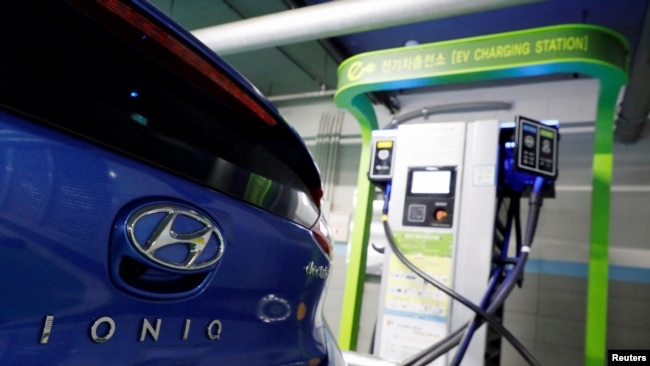自国保護はどの国でも取る政策です!!
景気後退がささやかれる現状ですから、なおさら。特に自動車は国益を左右すると言っても過言ではないでしょう。
韓国はもはや日本をどの分野でも追い越し、さらに前進しています。
アメリカも同様に韓国をアジアの中心と見ることでしょう。
WTOに持ち込まれないうちに話しいに折り合いが付くことが必要ですね。
VOAで英語を学びましょう!!
韓国、米国の新通商政策に怒り(和訳)
South Korea Angry Over New U.S. Trade Policy
September 15,2022
韓国は、アメリカの新しい税法が韓国の電気自動車(EV)メーカーを差別していると言っています。この問題は、長年の同盟国間の関係を脅かす可能性があります。
米国のインフレ抑制法が先月成立しました。北米で組み立てられた電気自動車の購入者に7500ドル相当の税額控除を提供するものです。
専門家は、この措置は北米でのEV製造を支援し、サプライチェーンから中国を遮断するために考案されたものだと言います。
また、同法案は海外で製造された一部の電気自動車に対する税額控除を取りやめました。中でも最も影響を受けるのは、韓国の自動車メーカーである現代と起亜(Hyundai and Kia)です。両社を合わせると、米国の電気自動車市場で最も販売台数の多い2位につけています。EVメーカーのテスラだけがより多く販売しています。
韓国の企業関係者は、新法は世界貿易機関の原則を裏切るものだと指摘します。また、米韓の自由貿易協定では、互いの輸入製品に対するこのような差別を禁止していると彼らは言います。
マスコミでは、保守系、リベラル系双方のオピニオンライターがこの政策を批判しました。中には、韓国政府は米国が主導するいくつかの経済プログラムに参加するのをやめるべきかという疑問もありました。これらのプロジェクトのいくつかは、アジアにおける米国の取り組みにとって重要であると考えられています。
韓国のアン・ドクグン貿易相は火曜日の記者会見で、貿易摩擦について次のように述べています。この問題は、これらのプログラムとは別に扱われるべきであると彼は言っています。しかし、この問題は”貿易関係そのものへの信頼を揺るがす”可能性があるとい彼は言います。
韓国の問題
中国とアメリカの両方と良好な関係を保つことは、韓国にとって難しいことです。韓国は約2万8000人の米軍の本拠地です。また、他のどの国よりも中国との貿易に依存しています。
韓国の保守派の大統領ユン・ソクヨルが5月に就任した。彼は米国との経済的、安全保障的関係を拡大するために動いています。
米国は、今回の米国の法案の影響を軽減するために韓国との協議に合意しています。しかし、韓国国内ではユン氏とアメリカのジョー・バイデン大統領の両者に向けられた批判が依然として多く存在します。
これまでのところ、その反応は主に出版された意見書や企業や政府関係者の声明に限られています。
ジョンミョン・ソ・ジョンミョン氏はソウルスンシル(崇実)大学の経済学部教授です。彼は、米国の政策は限られた韓国企業にしか影響せず、一般市民には感じられないかもしれない、と言います。
ですから、彼は韓国人が貿易法をめぐって大きな抗議をすることはないだろう、と考えています。
しかし、早く解決しなければ、ソウルがこの問題を世界貿易機関(WTO)に持ち込むなど、外交問題に発展する可能性もあります。経済的、外交的影響力の拡大に伴い、韓国がより強い立場を取ることを求める声もあります。
「もし韓国が受け身でいれば、再び大国の犠牲者になりかねません」と最近のハンギョレのオピニオンライターが言っています。「韓国は ’小国 ’意識を克服し、積極的な姿勢をとる必要があるのです。」と。
South Korea Angry Over New U.S. Trade Policy
South Korea says a new American tax law discriminates against South Korean electric vehicle (EV) makers. The issue may be a threat to relations between the long-time allies.
The United States Inflation Reduction Act passed last month. It offers tax credits worth as much as $7,500 to buyers of electric vehicles assembled in North America.
Experts say the measure was designed to assist EV manufacturing in North America and block China from supply chains.
The bill also cancelled tax credits for some electric vehicles made overseas. Among the most affected are the South Korean carmakers Hyundai and Kia. Together, they are in second place for most sales in the U.S. electric vehicle market. Only EV maker Tesla sells more.
South Korean business officials called the new law a betrayal of World Trade Organization principles. They also said that the U.S.-South Korea free trade agreement bans such discrimination against each other’s imported products.
In the press, both conservative and liberal opinion writers criticized the policy. Some questioned if the South Korean government should end its part in several U.S.-led economic programs in the country. Some of those projects are considered critical to U.S. efforts in Asia.
South Korean Trade Minister Ahn Duk-geun spoke of the trade dispute at a press conference Tuesday. It should be treated separately from those programs, he said. But, the issue could, he said, “shake the trust in the trade relationship itself.”
South Korea’s problem
Keeping good relations with both China and the U.S. is difficult for South Korea. It is home to about 28,000 American troops. It also depends on trade with China more than any other country.
South Korea’s conservative president, Yoon Suk Yeol took office in May. He has moved to expand his country’s economic and security relationship with the United States.
The United States has agreed to talks with South Korea to reduce the effect of the recent U.S. legislation. But there has still been much criticism in South Korea directed at both Yoon and American President Joe Biden.
So far, the reaction has mainly been limited to published opinion pieces and statements from business and government officials.
Jeongmeen Suh is an economics professor at Seoul’s Soongsil University. He says the U.S. policy only affects a limited number of South Korean companies and might not be felt by the average citizen.
So, he thinks it unlikely that South Koreans will hold any major protests over the trade law.
But if not settled quickly, the disagreement could result in diplomatic problems, such as Seoul taking the issue to the World Trade Organization. Some voices have called for South Korea to take a stronger position in line with its growing economic and diplomatic influence.
“If Korea remains passive, it could once again become the victim of the great powers,” says a recent opinion writer in Hankyoreh. “Korea needs to get over its ‘small country’ mentality and adopt an active posture.”
Words in This Story
assemble – v. to put something together
posture – n. an official stand or position, as that taken by a nation on a major issue
